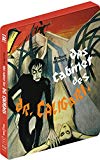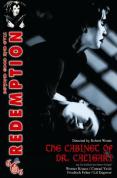![DER MÜDE TOD (Destiny) [Masters of Cinema] Dual Format (Blu-ray & DVD) edition](/pictures/1142882.jpg) DER MÜDE TOD (Destiny) | Blu Ray | (24/07/2017)
from £11.49
| Saving you £N/A (N/A%)
| RRP
DER MÜDE TOD (Destiny) | Blu Ray | (24/07/2017)
from £11.49
| Saving you £N/A (N/A%)
| RRP Before directing numerous genre defining masterpieces such as Metropolis, M, and Spione, Fritz Lang was already defying cinematic conventions with Der müde Tod (literally, The Weary Death). A young woman (Lil Dagover) confronts the personification of Death (Bernhard Goetzke), in an effort to save the life of her fiancé (Walter Janssen). Death weaves three romantic tragedies and offers to unite the girl with her lover, if she can prevent the death of the lovers in at least one of the episodes. Thus begin three exotic scenarios of ill-fated love, in which the woman must somehow reverse the course of destiny: Persia, Quattrocento Venice, and a fancifully rendered ancient China. Rich in expressionist imagery and featuring innovative special effects work, Der müde Tod has often been overlooked amongst Lang s early work, but has been hugely influential, with directors such as Alfred Hitchcock and Luis Buñuel citing it as a direct influence on their work. The Masters of Cinema Series is proud to present the film on Blu-ray and DVD for the first time in the UK in a new Dual-Format edition. DUAL FORMAT FEATURES: High definition presentation from the superb 2K restoration Original German intertitles with optional English subtitles Score by Cornelius Schwehr, performed by the Berlin Radio Symphony Orchestra under the direction of conductor Frank Strobel Feature length audio commentary by film critic Tim Lucas A new video essay by David Cairns A booklet featuring a new essay by Philip Kemp and more!
![Phantom/Die Finanzen Des Großherzogs [Masters of Cinema] [DVD]](/pictures/1096783.jpg) Phantom/Die Finanzen Des Großherzogs | DVD | (19/10/2009)
from £N/A
| Saving you £N/A (N/A%)
| RRP
Phantom/Die Finanzen Des Großherzogs | DVD | (19/10/2009)
from £N/A
| Saving you £N/A (N/A%)
| RRP Two Films by F.W. Murnau. After filming the landmark Nosferatu the silent cinema's master innovator F. W. Murnau demonstrated the reach of his genre versatility with a pair of films that explored the dimensions of the psychodrama and the adventure-programmer. All the Murnau characteristics are present: a vibrant naturalism exquisite imagery passages of dreamlike revery and an atmosphere redolent with romantic longing. In Phantom an aspiring poet on the verge of what he takes for a big break experiences a chance encounter with a beautiful woman in the street - and falls headlong into love and fantasy. With debts piling up and his promised literary celebrity failing to materialise the poet descends into obsession deception and ultimately a criminal act in this delirious film that stands as an early precursor of Hitchcock's Vertigo. Die Finanzen des Grossherzogs sees Murnau exploiting the Mediterranean clime to film the tale of a rakish duke whose lifestyle has dried up his noble coffers. When word arrives about the existence of valuable sulphur deposits on his tiny duchy of Abacco a comic adventure of high-seas intrigue animal impersonators and the Crown Princess of Russia unreels at a sprightly pace. Max Schreck (the mythic actor behind the makeup of Nosferatu's Count Orlok two years earlier) appears in a supporting role in what might be Murnau's nimblest effort.
 DAS CABINET DES DR CALIGARI (Masters of Cinema) Limited 2-disc Blu-ray SteelBook edition | Blu Ray | (16/01/2017)
from £N/A
| Saving you £N/A (N/A%)
| RRP
DAS CABINET DES DR CALIGARI (Masters of Cinema) Limited 2-disc Blu-ray SteelBook edition | Blu Ray | (16/01/2017)
from £N/A
| Saving you £N/A (N/A%)
| RRP Eureka Entertainment to release DAS CABINET DES DR CALIGARI, Robert Weine's sinister tale of psychosis and murder, set in a warped Gothic landscape, in a Limited Edition 2-disc Blu-ray SteelBook featuring the 2014 documentary From Caligari to Hitler as part of the Masters of Cinema Series on 16 January 2017. One of the most iconic masterpieces in cinema history, Robert Wiene's Das Cabinet des Dr. Caligari shook filmgoers worldwide and changed the direction of the art form. Now presented in a definitive restoration, the film's chilling, radically expressionist vision is set to grip viewers again. At a local carnival in a small German town, hypnotist Dr. Caligari presents the somnambulist Cesare, who can purportedly predict the future of curious fairgoers. But at night, the doctor wakes Cesare from his sleep to enact his evil bidding... Incalculably influential, the film's nightmarishly jagged sets, sinister atmospheric and psychological emphasis left an immediate impact in its wake (horror, film noir, and gothic cinema would all be shaped directly by it). But this diabolical tale nevertheless stands alone - now more mesmerising than ever in this Blu-ray SteelBook edition, along with a bonus Blu-ray disc containing the 2014 documentary From Caligari to Hitler, exploring the social and cultural impact of German Cinema during the Weimar Republic.
![Classics of German Cinema [2007]](/pictures/1070292.jpg) Classics of German Cinema | DVD | (21/05/2007)
from £73.71
| Saving you £-28.72 (N/A%)
| RRP
Classics of German Cinema | DVD | (21/05/2007)
from £73.71
| Saving you £-28.72 (N/A%)
| RRP Perhaps no period of any national cinema extends its influence so powerfully into the present day of movies as that of the German cinema of the Weimar era. From the fraught angles that accompanied magisterial set-design to the dreamlike interplay of light and shadow German films of the pre-WWII era defined the famed ""expressionistic"" visual style even as they tested the boundaries of social and sexual taboos. This collection contains five films. Four are classic films emblematic of the legendary Weimar period and one is an historical curiosity commissioned under the Nazi regime. Paul Wegener's and Carl Boese's 1920 film Der Golem represents the second (and the only fully surviving) film treatment by Wegener of the Yiddish folktale based around a towering clay monster created by magic corrupted by evil and redeemed ultimately by the force of the human soul. From the same year comes Robert Wiene's nightmarish classic The Cabinet of Dr. Caligari - a story of mesmerism sleepwalking and murder - a demented dreamscape that perhaps single-handedly galvanized the Expressionist movement of silent cinema. Nine years on Joe May's Asphalt opens a door to the sordid carnality lurking inside the Weimar heart of darkness - and gives audiences the gift of Betty Amann the greatest ""siren unsung"" of the early silver-screen. No lack of recognition would beset the besotted lead of Josef von Sternberg's 1930 masterpiece The Blue Angel - presented here in both its German- and English-language versions. Simply put this tale of a mild-mannered professor (Emil Jannings) sucked into the world of a licentious cabaret artiste introduced the public to an immortal: her name written among the stars would read ""Marlene Dietrich"". By 1943 a new era had dawned one in which Joseph Goebbels called the shots and it was Josef von Bky's Mnchhausen that epitomized the ""new German epic"" - a state-sanctioned Agfacolor melange of the picaresque and Aryan myth that nevertheless served to inspire Terry Gilliam's more benign modern fantasia The Adventures of Baron Munchausen. Myth sex magick and the ""tall-tale"": Classics of German Cinema: 1920-1943 presents the viewer with a selection of masterpieces that tower not only over the awesome first phase of German movies but over the origins of world cinema as a whole. 1. Der Golem 2. Das Cabinet Des Dr. Caligari 3. Asphalt 4. The Blue Angel 5. Munchhausen
![Das Cabinet Des Dr Caligari [1919]](/pictures/1033358.jpg) Das Cabinet Des Dr Caligari | DVD | (18/09/2000)
from £14.17
| Saving you £5.82 (41.07%)
| RRP
Das Cabinet Des Dr Caligari | DVD | (18/09/2000)
from £14.17
| Saving you £5.82 (41.07%)
| RRP In the little village of Holstenwall on the Dutch border fairground hypnotist Dr Caligari put on show a somnambulist called Cesare who has been asleep for twenty-three years. At night dressed in a black body-stocking and with a ghostly white face he slithers through the town murdering people on the doctor's orders. Robert Weine's silent black and white classic is now available digitally re-mastered on DVD for the first time!
![Doctor Mabuse - The Gambler [1922]](/pictures/1011861.jpg) Doctor Mabuse - The Gambler | DVD | (24/05/2004)
from £6.33
| Saving you £16.66 (263.19%)
| RRP
Doctor Mabuse - The Gambler | DVD | (24/05/2004)
from £6.33
| Saving you £16.66 (263.19%)
| RRP Dr Mabuse The Gambler is a fascinating reflection of German society in the 1920s and all its criminal-ridden decadence. In Fritz Lang's epic tale of domination by terror the power-crazed Mabuse (Rudolph Klein-Rogge) masterminds the world's most dangerous gang of counterfeiters thieves and murderers wielding hypnotic powers with an iron fist to obtain total obedience to his will! This double DVD set presents the complete 4 1/2 hour version of Lang's silent masterwork.
![Cabinet of Dr Caligari [DVD]](/pictures/1097051.jpg) Cabinet of Dr Caligari | DVD | (16/11/2009)
from £13.48
| Saving you £-3.49 (N/A%)
| RRP
Cabinet of Dr Caligari | DVD | (16/11/2009)
from £13.48
| Saving you £-3.49 (N/A%)
| RRP A horror film that surpasses all others. Alan relates the story of traveling magician Dr Caligari and Cesare. Their arrival in a town coincides with savage killings. Secretly Caligari was an asylum director who hypnotizes Cesare to re enact murders. But the final reel contains something which will leave an audience shattered. It blows away all your moral certainties and beliefs. This is the true power of its horror. To leave you vulnerable and uncertain of what you feel was secure and certain.
 The Cabinet Of Dr Caligari | DVD | (02/01/2006)
from £N/A
| Saving you £N/A (N/A%)
| RRP
The Cabinet Of Dr Caligari | DVD | (02/01/2006)
from £N/A
| Saving you £N/A (N/A%)
| RRP The Thrills The Chills Of Witchcraft Today College student Nan Barlow is researching the history of witchcraft. Taunted by her brother and fianc who have voiced their concern over her silly notions Nan arms herself with resolve and drives into the small New England village of Whitewood. She is glad that at least she was able to count on the support of her professor. A bit anxious but consumed with curiosity she will soon embark herself on the journey of her life!
 Spiders | DVD | (17/08/1999)
from £N/A
| Saving you £N/A (N/A%)
| RRP
Spiders | DVD | (17/08/1999)
from £N/A
| Saving you £N/A (N/A%)
| RRP ![Tartuffe [1926]](/pictures/1011373.jpg) Tartuffe | DVD | (24/01/2005)
from £N/A
| Saving you £N/A (N/A%)
| RRP
Tartuffe | DVD | (24/01/2005)
from £N/A
| Saving you £N/A (N/A%)
| RRP A devious housekeeper convinces her master to cut his worthy grandson out of his will and to leave the riches to her instead. The grandson disguised as the projectionist of a travelling cinema show flatters his way into the home to project a film of Tartuffe in an attempt to open his grandfather's eyes. F. W. Murnau made this film adaptation of Moliere's satire for UFA early in 1925 and it was released the following year shortly followed by 'Faust'. By presenting the play as a fi

Please wait. Loading...
This site uses cookies.
More details in our privacy policy